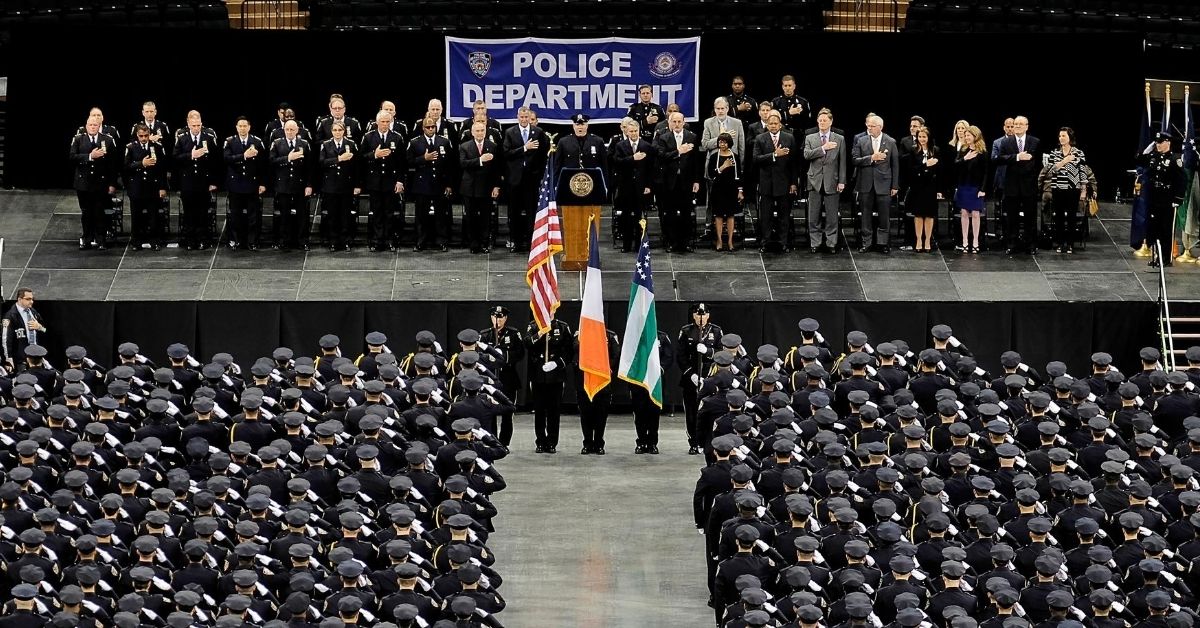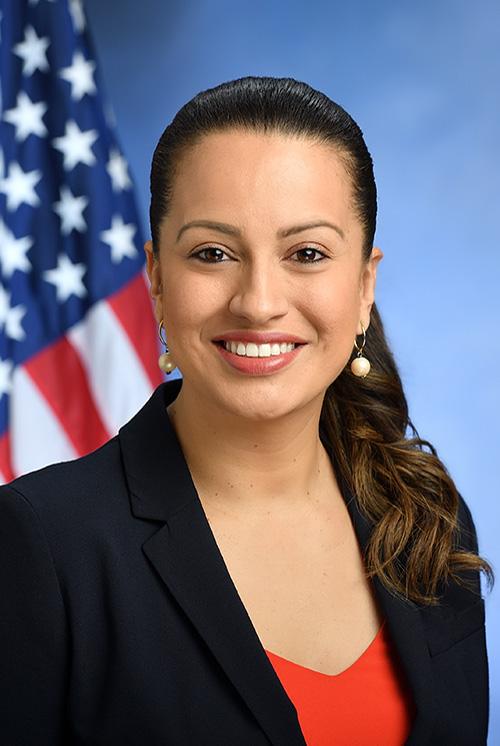
NYPD Police Academy Graduation Ceremony (Diana Robinson/Mayoral Photography Office)
Aug. 20, 2020 By Michael Dorgan
Assemblywoman Catalina Cruz has introduced legislation that would require all future NYPD recruits to live within the city in order to serve on the force.
The legislation seeks to improve the quality of policing in city neighborhoods by making sure that those who serve the community also live in the community.
The bill is being sponsored by State Sen. Kevin Parker in the senate and would require all NYPD officers hired after Jan. 1 2021 to live within the five boroughs.
The new recruits would have one year to move into New York City after they graduate from the Police Academy, according to the bill.
Cruz said that officers will have a greater desire to improve the neighborhoods they serve if they live among the population. She said the residency requirement would significantly improve relations between cops and residents which would in turn benefit the community as a whole.
“When you have a police officer who, at the end of their workday, is able to clock out and tune out and not really have to think about the consequences of not just their own actions, but the force … they don’t feel invested,” Cruz said during a Zoom press briefing Wednesday.
Around 49 percent of uniformed NYPD cops presently reside within the five boroughs, according to official police data. There are nearly 36,000 uniformed officers serving in the force.
Under current rules, cops who have completed two years of service are permitted to reside in the city as well as in Westchester, Rockland, Orange, Putnam, Nassau or Suffolk counties.

Assemblywoman Catalina Cruz (NY State Assembly)
Cruz, who represents residents of Corona, Elmhurst and Jackson Heights, said the bill forms part of a wider effort to reform the NYPD and the criminal justice system in light of widespread protests against police brutality.
She said that the low numbers of cops living among the community has made it harder to bring about the necessary changes.
“I want an officer who is so invested in their work that they’re willing to have the conversation about how to reform a system that they’re a part of,” Cruz said.
“We can’t have the conversation about equality and brutality about what is happening in our community if the people who are patrolling our streets are not from our communities,” Cruz said.
Cruz also touted the economic benefits of the bill, noting that the salaries the officers earn would be spent in the city and not in the suburbs. She said this would help the local economy at a time when it is undergoing a downturn.
The bill, which is in committee stage, would not apply to existing serving officers.
Parker said that he was not in favor of uprooting cops who have been serving the force for a long period of time.
“We’ll add enough police that over time we’ll get there,” Parker said.
Parker said that while the state legislature is not currently in session, he wants the bill to be voted on when representatives are called back to deal with budgetary matters. Parker said he expects members to be called back shortly.
Mayor de Blasio said at a press conference last week that he supports more officers residing in the city but said that living costs are too high to force such a move.
However, around 94 percent of civilian workers for the NYPD live in the city, according to data obtained by Streetsblog.
The NYPD’s civilian workforce has a residency requirement and are paid less than uniformed officers.
14 Comments

So now when a cop puts a drug dealer behind bars for 20 years his crew can run into the cop on the streets and learn where he and his family live. Smart move!!
That’s wonderful……so we’re only a pen stroke away from a government mandate possibly requiring a person to be a NYC resident in order to have and keep a job. So if your a gifted Neurosurgeon living in Old Brookville …..your no longer able to practice in NYC? If you can do that with the police …..you can do that with any profession or career…..aspire to nothing better
I don’t know if I agree with the policy but you are being obtuse. This is about CITY employees, not the private sector.
You are missing the point of JMurphy’s comment. Once government has power over you, they have the power to change anything.Making it a requirement for cops to live in NYC is just an example of the control they can have.
When attempting to get the best and most qualified employees for a job most employers look to expand the potential candidate pool. The NYC City Council wants to decrease the candidate pool which will lead to less qualified police officers getting hired. Not smart. But then again, as Barack Obama would say, “elections have consequences.” And boy did the people of NYC choose wrong.
Good luck getting recruits to live in the five boroughs. If it wasn’t for people from the suburbs applying to the NYPD, there would be a shortage of cops.Who wants to live in NYC?
Somebody should inform the members of the City Council that NYers are fleeing the city in droves due to their extremist agenda. They should also be informed that NYC police officers are fleeing the NYPD in droves due to once again, their extremist agenda. Who in their right mind do they think will want to become and actually keep the job of being a police officer in NYC?
Maybe they should just use their mom’s address in NYC, just as Joe Crowley did while living in Virginia instead of the district he represented?
Have no fear: nobody is going to want to join the police anymore with DeBozo as mayor and Cuomo as governor and lunatics running Albany – all one party rule.
To control any worker’s freedom of movement is government overreach. The Democrats reveal their dictatorial goals every day. This is Un-American!!!
All workers are still free to go wherever they want, and seek whatever job they want on the free market.
You don’t understand this article.
I think “you” don’t understand the ramifications of passing legislation requiring residency. Please read it again and think hard.
If you don’t think forcing workers to live within a certain area is restricting freedom of movement then you don’t understand basic liberties.
All workers are still free to go wherever they want, and seek whatever job they want on the free market